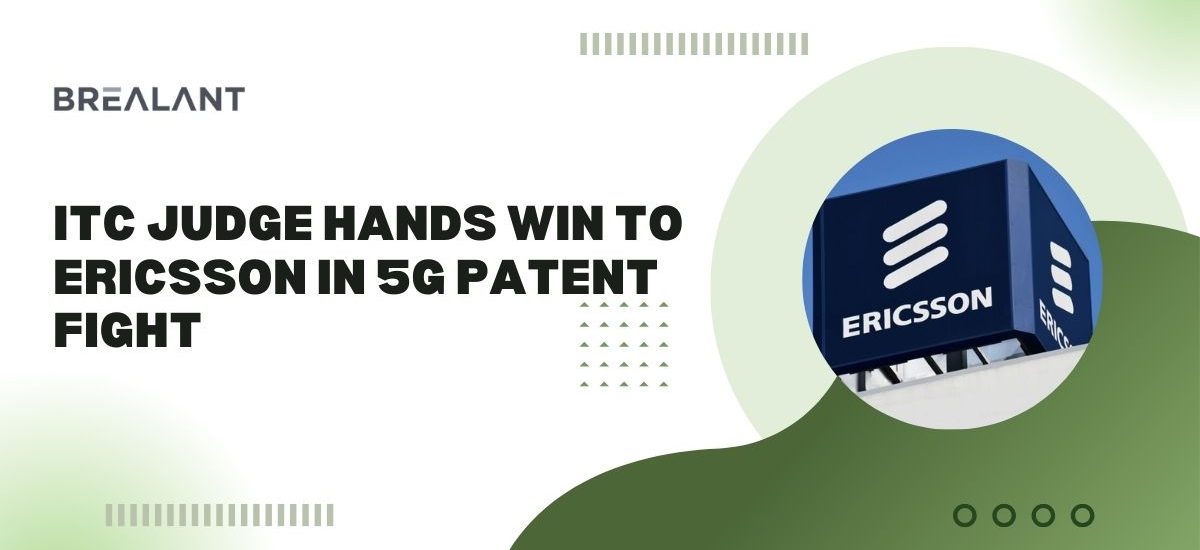



A judge at the U.S. International Trade Commission (ITC) has ruled in favour of Ericsson in its 5G patent fight, a landmark decision that will have a big impact on the IT sector. The ruling emphasises the legal disputes that frequently support technical breakthroughs and the crucial role that intellectual property (IP) plays in the very competitive telecom industry. Here is a more thorough examination of the case, its ramifications, and its future consequences for the industry. Let’s delve into the blog to know more about the case.
Leading telecoms technology company Ericsson complained to the ITC that certain businesses were importing and selling goods in the US that violated its patents for 5G. These patents, which include technologies including network connection, data transfer, and improved device communication, are crucial for putting 5G standards into practice. Among the businesses charged with infringement were significant producers and suppliers of smartphone components.
Ericsson’s claim that its inventions were being unjustly used without the appropriate license agreements was at the centre of the lawsuit. Ericsson brought the action before the ITC in an effort to safeguard its intellectual property and stop illegal imports of devices that violated the law into the United States.
The ITC judge decided in favour of Ericsson following months of hearings and inquiry. The ruling upheld Ericsson’s allegations that the respondents had imported goods that violated its patents, in violation of Section 337 of the Tariff Act of 1930. The court suggested a limited exclusion order that would prevent the infringement items from entering the United States if they were accepted by the entire commission.
The decision, which upholds Ericsson’s rights to its intellectual technology, marks a major turning point for the corporation. It also serves as a reminder to other telecom sector participants of the need to adhere to intellectual property agreements.
1.The Increasing Significance of 5G: By providing higher data rates, reduced latency, and the networking of billions of devices, 5G technology is transforming several sectors. 5G is the foundation for future innovation in everything from driverless cars to smart cities and the Internet of Things (IoT). As a result, 5G patents are extremely valuable, and disagreements over them have become more frequent. Ericsson’s triumph highlights how fiercely contested the 5G race is. Businesses that spend billions on research and development to create 5G technology depend on patent protections to recover their costs and keep their market- leading positions.
2.Consequences for SEPs (standard essential patents): The case demonstrates the intricacies of SEPs, which are patents necessary to adhere to technical standards like 5G. SEP owners must provide them licenses on FRAND (fair, reasonable, and non-discriminatory) conditions. However, disputes over what qualifies as FRAND provisions sometimes result in legal action. The victory for Ericsson may improve its negotiating position in upcoming licensing talks and establish a standard for the treatment of SEPs in court cases. It also reaffirms that businesses cannot circumvent license agreements without incurring penalties.
3.Effects on International Supply Chains: The ITC has significant authority to sabotage international supply networks because of its jurisdiction over imported goods. Manufacturers may be forced to alter their goods, get new licenses, or stop selling them in the US market if a limited exclusion order is issued against the infringing items. This may have repercussions for distributors, end users, and component suppliers throughout the sector.
A Call to Action for Manufacturers and Innovators‒ The decision serves as a reminder of how crucial it is to carry out exhaustive due diligence on patent portfolios before launching goods. Businesses that disregard intellectual property rights run the danger of expensive legal disputes and business interruptions.
Promoting Cooperation and Licensing Contracts‒ The case emphasises the importance of proactive licensing arrangements, even when litigation is occasionally inevitable. Businesses may prevent conflicts and promote a more cooperative atmosphere for innovation by establishing reasonable and open conditions.
Increasing IP Protections‒ According to Ericsson, the decision demonstrates the robustness of its intellectual property portfolio and its dedication to protecting its rights. It conveys to rivals that strong IP protections are strategic assets for preserving a competitive edge as well as legal instruments.
An important development in the ongoing dispute over 5G patents is the ITC judge’s finding in favour of Ericsson. It emphasises how crucial it is to protect intellectual property rights in a world of continuously changing technology. For Ericsson, the win strengthens its status as a pioneer in 5G innovation and serves as a cautionary tale about the dangers of violating patents.
To overcome these obstacles, businesses must carefully weigh the necessity to safeguard their inventions against the more general objective of developing technology for the good of all. Ensure the safety of your intellectual property with Brealant’s IP experts.